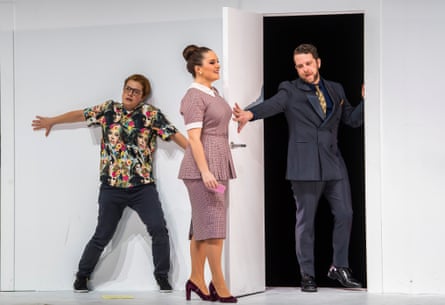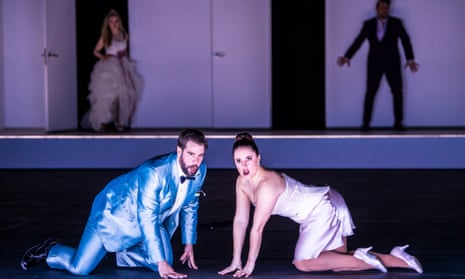Sometimes simple solutions really do work best. Joe Hill-Gibbins’ new production of The Marriage of Figaro for English National Opera stages Mozart and Da Ponte’s tangle of intrigues and concealments along a row of four identical doors in a white box. It’s a revelation: this is, after all, a piece in which the issue of who’s in on the joke (and who’s out) is crucial – and the humble door is its ideal multiway tool.
Such a straightforward conceit leaves plenty of space for characters to emerge. From the overture – staged as a series of increasingly anarchic tableaux vivants, establishing the production’s hyperstylised look – there’s a riot of witty details. Raised eyebrows, meaningful glances, absurd choreography. Much of it is very funny.

That attention to detail wasn’t always matched in the pit. Under Kevin John Edusei (one of numerous ENO debuts here), tempi were fast and momentum was king, but the brass sounded approximate at times and singers and orchestra repeatedly came adrift. It’s a shame, because the singing was otherwise the best I’ve heard at the Coliseum for years. In an overdue house debut, Louise Alder was an irresistible Susanna, a beautifully judged mix of cartoon coquettishness and emotional depth. Božidar Smiljanić’s Figaro was physically imposing but vocally agile, Johnathan McCullough was ideally cast as a fratboy-cum-Count, Hanna Hipp was a joy to behold as a skater boy Cherubino and Susan Bickley a class act as Marcellina. Elizabeth Watts’ Countess brought real poise to her moments in the spotlight as the opera’s least comic character.
Hill-Gibbins’ production comes into its own precisely when it ceases to be funny, allowing the brash comedy of infidelity, groping and double standards to fall away. At its shocking climax, the Countess, humiliated by her husband’s attempt to seduce her while disguised as Susanna, picks herself up and walks slowly – painfully slowly – away from the audience without looking back. Susanna watches silently, all pity. Minutes later, the final scene (our promised happy ending) is too bright, too loud, too fake, too fast – and the mirage evaporates. The Count is left alone, the doors shut against him.
At the Coliseum, London, until 18 April.

Comments (…)
Sign in or create your Guardian account to join the discussion